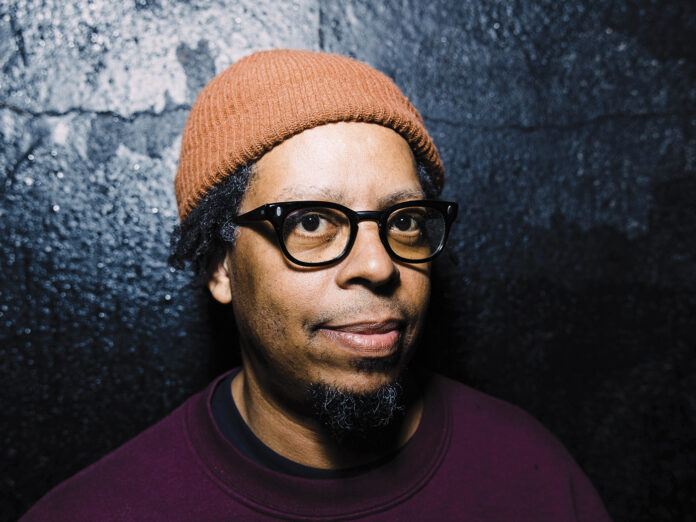Jeff Parker is best known to rock fans as a key member of the Chicago post-rock ensemble Tortoise, someone who adds a rigour, virtuosity and high-gloss to their proggy instrumentals. But he’s also spent more than three decades exploring many different types of music. The Chicago scene from which Parker emerged in the 1990s was characterised by unusual collaborations between musicians from different genres, all playing together in odd combinations. As well as working with Tortoise, Parker would find himself playing regular sessions with the minimalist gumbri player Joshua Abrams, electronic explorers Isotope 217 and various free jazz musicians, including the likes of trumpeters Rob Mazurek and Jaimie Branch, saxophonist Matana Roberts and drummers Hamid Drake, Chad Taylor and Makaya McCraven.
Jeff Parker is best known to rock fans as a key member of the Chicago post-rock ensemble Tortoise, someone who adds a rigour, virtuosity and high-gloss to their proggy instrumentals. But he’s also spent more than three decades exploring many different types of music. The Chicago scene from which Parker emerged in the 1990s was characterised by unusual collaborations between musicians from different genres, all playing together in odd combinations. As well as working with Tortoise, Parker would find himself playing regular sessions with the minimalist gumbri player Joshua Abrams, electronic explorers Isotope 217 and various free jazz musicians, including the likes of trumpeters Rob Mazurek and Jaimie Branch, saxophonist Matana Roberts and drummers Hamid Drake, Chad Taylor and Makaya McCraven.
Parker relocated to Los Angeles around a decade ago, where he has found himself at the nexus of a burgeoning scene which is, in its own way, as diverse as Chicago’s, where members of bands like Bright Eyes, Grizzly Bear and Shabazz Palaces might rub shoulders with genre-transcending musicians such as Carlos Nino, Miguel Atwood Ferguson, Nate Mercereau and Laaraji.
In 2018 Parker started a weekly Monday-night residency at a small venue in LA’s Highland Park suburb called the Enfield Tennis Academy with three like-minded friends – Australian bassist Anna Butterss, drummer Jay Bellerose and alto saxophonist Josh Johnson. Until the venue closed in late 2023, the quartet would play each Monday night in front of around 50-100 people, first playing jazz standards and bebop tunes, and eventually playing lengthy improvisations that could last anything from 10 minutes to an hour in length.
This entire album was recorded at one of those sessions in January 2023, in front of an audience. Only the first track here was pre-written: Parker’s 24-minute opener “Freakadelic” starts with him and alto saxophonist Josh Johnson playing an angular melody in unison, one that dimly resembles the Brecker Brothers’ “Some Skunk Funk”, over a rock-solid funk bassline by Butterss, before spinning out into a piece of psychedelic free improvisation. The other three tracks are collective improvisations.
Parker is not a flashy, freak-out guitarist. There are touches of Metheny-style virtuosity in everything he does, but he usually plays to a ruthless harmonic logic, one that comes from listening closely to what his bandmates are doing. A lot of his work has been about using repetition creatively, and this is very much how this ensemble engages as a unit. Parker, Butterss or Johnson will start each piece with a simple riff which is repeated, imitated and tweaked until it provides the spark for ruminative improvisations, the mood usually dictated by Bellerose, who often starts songs playing in a textural and delicate manner before slowly moving into more insistent beats, like the brushed post-rock drums on “Late Autumn” or the creepy bossa nova beat that pulses through “Easy Way Out”.
What’s sometimes difficult to believe is that this is an entirely live album, recorded by engineer Bryce Gonzales, who set up four microphones and fed them into a two-track mixer, mixing the band in real time. All four musicians use effects units, but none were applied in post-production or in the mix – all are being deployed in real time. Saxophonist Josh Johnson often plays through a digital harmoniser, which sometimes makes him play in fourths (on the first track), in thirds (on “Late Autumn”) and in octaves (on “Easy Way Out”). Often the harmoniser makes his instrument sound like some eerie cyborg, half human musician, half digital construct. Parker’s guitar is sometimes put through loop pedals, or digital delay: on the opening track his gentle arpeggios start to sound like a Javan gamelan; elsewhere he sounds like an organ drone.
On “Chrome Dome”, what starts as an unaccompanied sax solo soon develops into a full-on piece of dub reggae, with Butterss’s double bass digging deep into sub-bass territory and Jay Bellerose’s drum kit slowly becoming shrouded in reverb, as if recreating Lee “Scratch” Perry’s Black Ark in real time, all flaring snare drums and echo-drenched hi-hats.
It’s possible that this quartet might not play together again for a long time, especially without a regular residency. Anna Butterss recently released an acclaimed solo album and tours with the likes of Jason Isbell and Phoebe Bridgers; Jay Bellerose’s many regular engagements includes being a member of Robert Plant and Alison Krauss’s touring band, while Jay Johnson works with the likes of Leon Bridges, Meshell Ndegeocello, Harry Styles and the Red Hot Chilli Peppers. It means that this LP could serve as a document of an improvising four-piece at its best.
When you purchase through links on our site, we may earn an affiliate commission. Here’s how it works.



